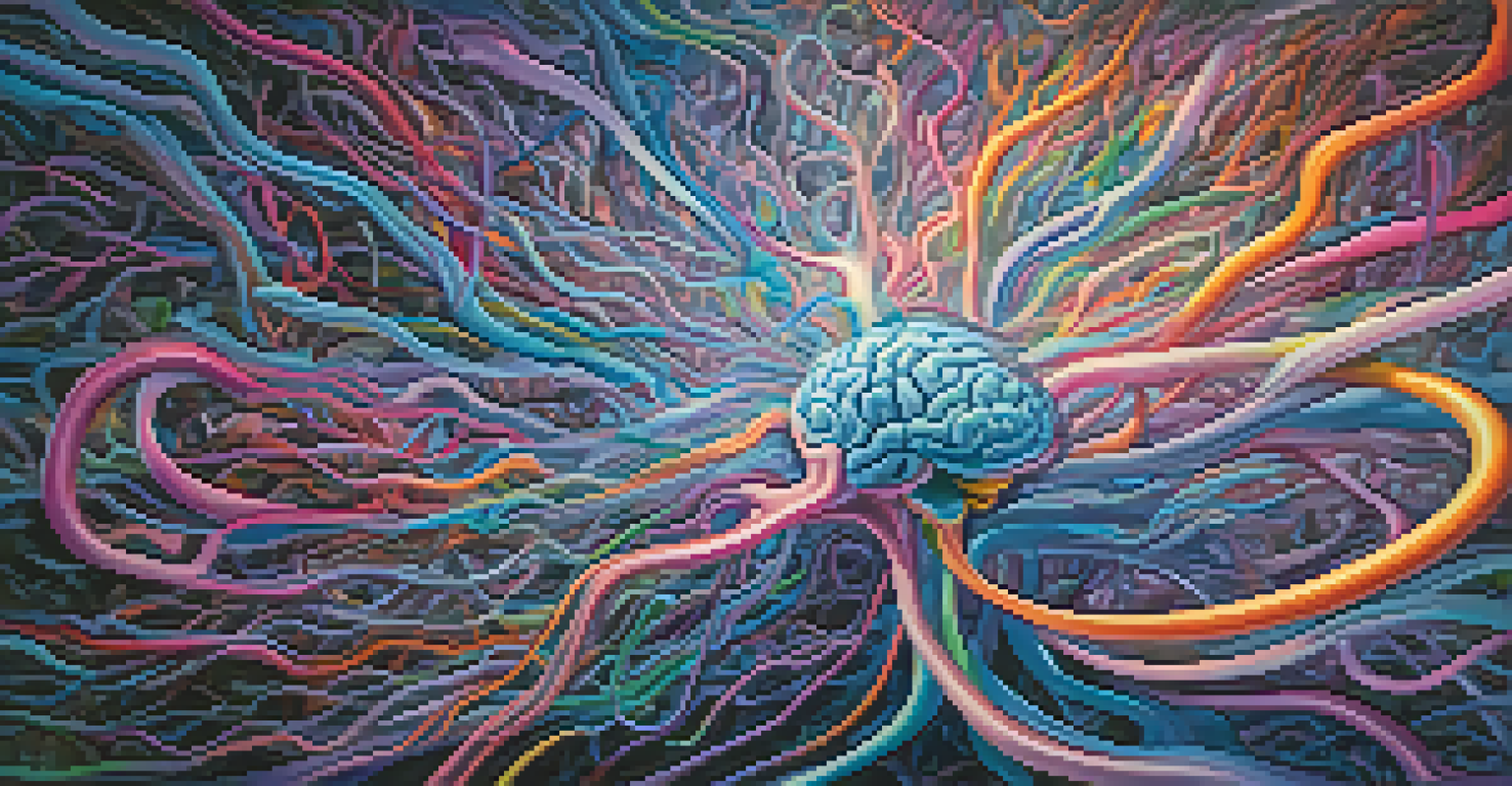Hallucinogens: A Gateway to Altered Existential Perspectives

Understanding Hallucinogens and Their Effects
Hallucinogens are substances that alter perception, mood, and cognitive processes. Common examples include psilocybin, LSD, and mescaline. They can induce experiences that drastically reshape how individuals perceive reality, often leading to profound insights.
The greatest discovery of my generation is that a human being can alter his life by altering his attitude of mind.
When consumed, these substances can create vivid hallucinations or distortions of time and space. Imagine looking at a tree and seeing it pulse with energy or feeling as if time has slowed to a crawl. Such experiences can encourage users to reflect on their lives and the world around them.
While some may fear the unknown aspects of these substances, many users report positive changes in their existential perspectives. They often find themselves more connected to nature, humanity, and their own inner thoughts, prompting a deeper understanding of existence.
The Historical Context of Hallucinogen Use
Hallucinogens have been used for centuries across various cultures, often in spiritual or religious contexts. Indigenous groups in the Americas, for instance, utilized peyote in rituals to connect with the divine. This historical backdrop highlights their potential to elevate consciousness and create a sense of belonging.

In the mid-20th century, hallucinogens gained popularity in Western culture as tools for exploration of the mind. Think of the counterculture movement of the 1960s, where figures like Timothy Leary advocated for their use in expanding perception. This era sparked significant interest in the psychological effects of these substances.
Hallucinogens Alter Perception
Hallucinogens like psilocybin and LSD can significantly change how individuals perceive reality, leading to profound insights and existential reflections.
Despite their controversial status, many researchers are now revisiting the therapeutic potential of hallucinogens. Studies suggest they might aid in treating mental health disorders, providing an avenue for healing while also promoting existential reflection.
The Science Behind Hallucinogens
At the core of hallucinogenic experiences is the interaction between these substances and the brain’s neurotransmitters. For instance, psilocybin mimics serotonin, a chemical that helps regulate mood and perception. This interaction can lead to changes in brain connectivity, resulting in unique experiences of reality.
The mind is everything. What you think you become.
Research shows that under the influence of hallucinogens, individuals may experience a breakdown of the normal boundaries between the self and the external world. This phenomenon can foster a sense of unity with nature and others, reshaping existential beliefs.
Moreover, studies utilizing neuroimaging reveal that areas of the brain typically associated with ego and self-identity may become less active during hallucinogenic experiences. This reduced activity can lead to a temporary dissolution of the ego, allowing individuals to explore new dimensions of thought and awareness.
Personal Transformation Through Hallucinogens
Many users of hallucinogens report transformative experiences that alter their perception of life. After a trip, individuals often find themselves re-evaluating their priorities and relationships. It’s as if a veil has been lifted, revealing a more profound sense of connection to the universe.
For example, someone might embark on a hallucinogenic journey and emerge with a newfound appreciation for art or nature. These experiences can inspire creativity and a deeper understanding of personal values, leading to positive life changes.
Therapeutic Potential Explored
Recent studies are investigating the use of hallucinogens in therapy, showing promise in treating mental health conditions such as depression and PTSD.
However, it's essential to approach these substances with caution, as not every experience is positive. Setting, mindset, and intention play critical roles in shaping the outcomes of these journeys, underscoring the need for responsible use.
Challenges and Risks of Hallucinogen Use
While hallucinogens can lead to profound experiences, they are not without risks. Some individuals may experience anxiety, paranoia, or challenging hallucinations, known as 'bad trips.' These negative experiences can be distressing and may lead to lasting psychological effects.
Additionally, the legal status of many hallucinogens varies widely, which can complicate access and safe use. This legal ambiguity can also contribute to stigma, making it difficult for individuals to discuss their experiences openly.
Moreover, not everyone is a suitable candidate for hallucinogen use. Those with a personal or family history of mental health issues should exercise caution, as these substances can exacerbate underlying conditions.
Hallucinogens and Modern Therapy
Recent research has reignited interest in the therapeutic potential of hallucinogens. Clinical trials are exploring their use in treating conditions like depression, PTSD, and addiction. Preliminary results suggest that guided hallucinogenic experiences can lead to significant improvements in mental health.
Therapists often utilize these substances in controlled environments, providing support and guidance during the experience. This therapeutic approach can help individuals confront deep-seated emotions and traumas, promoting healing and personal growth.
Risks and Responsible Use
Despite their benefits, hallucinogens carry risks, including potential negative experiences and legal concerns, highlighting the need for cautious and informed use.
As society continues to evolve in its understanding of mental health, hallucinogens may find a more accepted role in modern therapy, bridging the gap between traditional treatments and alternative approaches.
The Future of Hallucinogen Research and Use
As research on hallucinogens expands, the future looks promising for their integration into both therapy and personal exploration. Scientists are increasingly advocating for their potential benefits, aiming to destigmatize their use and promote responsible practices.
With ongoing studies, we may soon see hallucinogens gain approval for therapeutic use in mainstream medicine. This shift could lead to a new wave of understanding about consciousness and the human experience, changing how we approach mental health.

However, as we move forward, it’s essential to balance enthusiasm with caution. Continued education and awareness about responsible use will be key in ensuring that hallucinogens are seen not just as substances, but as tools for profound personal transformation.